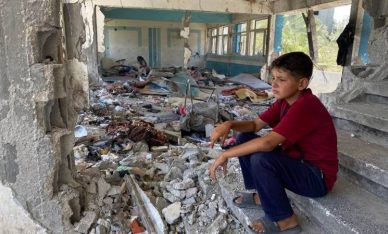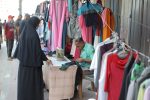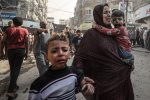(PIC)
The Office of Martyrs, Wounded, and Prisoners Affairs, affiliated with the Islamic Resistance Movement, Hamas, issued a document in which it reviewed Israeli violations against Palestinian prisoners and detainees in occupation prisons, The following is the text of the document:
Israeli violations have escalated unprecedentedly since October 7, 2023, with the number of prisoners and detainees reaching approximately 9,500 Palestinian detainees. They are subjected to a hellish experience of starvation, humiliation, torture, limb-breaking, and the killing of dozens of them as a result of torture in camps and interrogation cells, or due to deliberate medical negligence.
The violations committed by the Israeli occupation against the prisoners include suppression, beating, physical and psychological torture, starvation, strip searches, inhumane and degrading treatment, detention without trial through administrative detention, and the so-called “unlawful combatant” law against prisoners from the Gaza Strip. It also includes preventing visits by lawyers, legal teams, the Red Cross, and families. Access to health and medical care is restricted, and the use of solitary confinement for years is practiced. These methods are considered violations of the requirements of the Geneva Conventions and numerous other international treaties that guarantee the rights of prisoners and detainees.
This document presents summarized aspects of the numerous violations faced by the prisoners, supported by legal provisions confirming the violation of these violations of international laws.
Forcible disappearance of prisoners, especially Gaza prisoners
Citizens are arbitrarily arrested without disclosing their place of detention, their conditions, or any information about them. The number of forcibly disappeared Palestinian prisoners has reached 849 detainees, confirmed by the Israeli occupation state in its military camps and prisons. Meanwhile, the Al-Mezan Center for Human Rights counted more than 1,600 Palestinian prisoners in a state of forced disappearance, and there is evidence that the number is much higher. No human rights or international centers know their whereabouts or allow visits to them, and they are dealt with under an invented Israeli law called the “unlawful combatant.”
Violation of international law
- International Declaration for the Protection of All Persons from Enforced Disappearance: This declaration states that enforced disappearance is considered a violation of international laws and must be prevented in all circumstances. The declaration emphasizes that every victim has the right to know the truth about the circumstances surrounding the disappearance.
- Article 9 of the International Covenant on Civil and Political Rights (ICCPR): It states that no one should be subjected to arbitrary detention, and every detained person has the right to know the reasons for their detention and to be tried fairly. Enforced disappearance directly violates this right.
- Convention against Torture and Other Cruel, Inhuman or Degrading Treatment or Punishment: Enforced disappearance can be classified as a form of torture due to the pain and severe suffering it causes to the victims and their families.
- Geneva Conventions: In the context of armed conflict, the Geneva Conventions prohibit enforced disappearance of protected persons and require the warring parties to provide information about detainees to other parties and humanitarian organizations such as the Red Cross.
Torture
The Israeli authorities began practicing torture against Palestinian detainees since their occupation of Palestine. They have used various methods to torture detainees mentally and physically, such as violent shaking, forced to sit in awkward position on a small chair, placing a bag over the head, loud music, the cupboard, nail extraction, and even amputation of limbs of prisoners due to the handcuffs that prisoners are shackled with, for hours and days. This has resulted in the death of 254 prisoners in prison cells since 1967 as a result of the torture they endured during the interrogation or deliberate medical negligence. From October 7, 2023, until today (14/5/2024), the number of martyrs among the prisoners reached 18, according to official Israeli statistics. However, dozens of martyr prisoners due to torture in Israeli camps have not been verified by human rights institutions due to the enforced disappearance practiced by the occupation forces against prisoners.
Violation of international law
- Convention against Torture (UNCAT): Adopted in 1984, this convention states that under no circumstances should torture be used, and it is strictly prohibited regardless of the security situation or any political emergency. State parties are committed to preventing torture in areas under their judicial control.
- International Covenant on Civil and Political Rights (ICCPR): The covenant prohibits the use of torture and cruel, inhuman, or degrading treatment or punishment. Article 7 of the covenant states that “no one shall be subjected to torture or to cruel, inhuman or degrading treatment or punishment.”
- Geneva Conventions: Especially the Fourth Geneva Convention relating to the protection of civilians in time of war, which provides protection for persons in the hands of the enemy. Torture is considered a violation of this protection.
- Universal Declaration of Human Rights: The Declaration affirms the prohibition of torture and other cruel, inhuman, or degrading treatment or punishment.
Law on the execution of prisoners
The proposed law on the execution of Palestinian prisoners, which was discussed or proposed in the so-called Israeli Knesset, raises great concern regarding its violation of international laws and standards. This most extreme law was introduced in 2015 and reintroduced in December 2017. It was approved by the coalition government and passed its preliminary reading in the Knesset on January 3, 2018. The law requires the approval of two military judges and does not require unanimity to decide on the execution of Palestinian prisoners convicted of killing Israelis. It is worth noting that the occupation has carried out actual and field executions outside the scope of the law, having executed about 250 Palestinian citizens since October 2015. It also conducted the largest field execution campaign against civilians in the Gaza Strip during the ground invasion of the Strip after October 7, 2023.
Violation of international law
- Geneva Conventions: The First Additional Protocol to the Geneva Conventions states the protection of prisoners from execution without fair and impartial trial that provides all internationally recognized judicial guarantees. Imposing the death penalty on prisoners based on charges related to the armed conflict may constitute a violation of these conventions.
- Article 6 of the International Covenant on Civil and Political Rights (ICCPR): It states that the death penalty should only be applied for the most serious crimes and in accordance with the law in force at the time of the commission of the crime, and it can only be applied after a trial that provides all necessary guarantees for the defense.
- International Humanitarian Law: It prohibits the arbitrary use of the death penalty or as a tool for revenge against individuals who have been captured in the context of an armed conflict.
- International Human Rights Conventions: Most international conventions call for the reduction in the use of the death penalty, and some, such as the Second Optional Protocol to the International Covenant on Civil and Political Rights aimed at abolishing the death penalty, encourage states to abandon this practice.
Deliberate medical neglect
Prisoners are subjected to deadly medical neglect, which has significantly intensified after October 7, 2023. The Israeli prison administration has ceased providing prisoners with any medications or treatments. No medical examinations are conducted, and prisoners are not transferred to hospitals or even to the prison clinic. Fractures are left untreated, and wounds are not dressed for prisoners who suffer from injuries resulting from continuous repression and torture. Fungal infections and scabies have spread among many of them, and chronic skin diseases have consumed their bodies.
A bill has been proposed to cut off funding for the treatment of wounded and sick prisoners, in order to continue and escalate revenge against sick Palestinian prisoners under the pretext of resisting the occupation. This means that the expenses for treating the wounded and sick among the prisoners will be covered by the families of the prisoners themselves or deducted from the funds of the Palestinian National Authority, which according to claims of the occupation amount to 40 million shekels annually. The number of sick prisoners has reached 700, including 24 cancer patients.
Violation of international law
- Geneva Conventions: The Third and Fourth Geneva Conventions state that prisoners and protected persons must receive necessary medical care equivalent to that provided to the armed forces of the detaining state. These conventions explicitly prohibit the neglect of prisoners’ health.
- Article 25 of the Universal Declaration of Human Rights: It states that everyone has the right to a standard of living adequate for health and well-being, including food, clothing, housing, and medical care.
- Article 10 and Article 12 of the International Covenant on Economic, Social and Cultural Rights (ICESCR): Emphasize the right to the highest attainable standard of physical and mental health and affirm that detained persons deserve humane treatment and respect for their inherent dignity.
- United Nations Standard Minimum Rules for the Treatment of Prisoners: State that prisoners should receive the same level of healthcare available to the general community, and that medical care should be accessible without discrimination.
Policy of starving prisoners
The Israeli occupation has adopted a policy of starving and depriving prisoners of water and food in prisons, similar to the situation in the Gaza Strip. Testimonies from released prisoners and reports from the occupation itself, as well as some documented evidence, have confirmed that the occupation systematically practices starving policies against all prisoners. Additionally, they are deprived of their basic human rights. When comparing the condition of prisoners before and after their detention, the magnitude of the crime of starving prisoners becomes evident.
Violation of international law
- Geneva Conventions: Specifically, the Fourth Geneva Convention prohibits torture, cruel, inhuman, or degrading treatment of prisoners. Article 76 of the Fourth Geneva Convention emphasizes that prisoners must be kept in healthy conditions and provided with sufficient food to ensure their good health.
- International Covenant on Civil and Political Rights (ICCPR): It states that no one shall be subjected to torture or to cruel, inhuman, or degrading treatment or punishment. Starvation is considered a form of cruel and torturous punishment.
- Convention against Torture: It prohibits all forms of torture and cruel, inhuman, or degrading treatment. Starvation as a means of torture directly violates this convention.
- United Nations Standard Minimum Rules for the Treatment of Prisoners (Nelson Mandela Rules): It states that prisoners should be adequately fed and provided with nutritionally adequate food for human health and strength, taking into account dietary and religious requirements.
Detention of children
The Israeli occupation continues to detain more than 200 Palestinian children in its prisons. Since October 7th of last year, they have faced retaliatory measures imposed by the occupation on all categories of prisoners in all prisons. In a new step of its policy of targeting children, the occupation state has amended its laws regarding the arrest, interrogation, trial, and incarceration of Palestinian children, subjecting them to imprisonment and allowing judges in its courts to impose pretrial detention and actual imprisonment on Palestinian minors from the age of 12 and to broaden the charges against them. These charges include any crimes related to what the occupation labels as “terrorism” and interprets in its own way, such as throwing stones and participating in protests, among others.
Violation of international law
- Convention on the Rights of the Child (CRC): The convention states that the arrest of a child should be the last resort and for the shortest possible period. It prioritizes the best interests of the child and ensures their rights to education, protection from violence, and access to fair justice. The arrest of children and their exposure to military trials violate these rights.
- Article 37 of the Convention on the Rights of the Child: It states that “No child shall be subjected to torture or other cruel, inhuman or degrading treatment or punishment. No child shall be deprived of his or her liberty unlawfully or arbitrarily.”
- United Nations Rules for the Protection of Children Deprived of their Liberty (Beijing Rules): These rules provide guidance on how to treat children in the justice system. They emphasize the need to provide treatment that takes into account the age and developmental status of the child while preserving their dignity and value as individuals.
- International Humanitarian Law: In the context of conflicts, children should always be treated as victims and provided with protection and care. Children should be protected from the negative consequences of war and their future secured.
Detention of women
Monitoring and documentation studies indicate that the occupation authorities have arrested more than 16,000 Palestinian women since 1967. Since the signing of the Oslo Accords, 2,500 Palestinian girls and women have been arrested. Among them are four prisoners who gave birth in harsh and difficult conditions inside prisons.
The occupation continues to detain 90 women and girls in its prisons, some of whom are subjected to arbitrary administrative detention without charge.
Since October 7th of last year, Zionist occupation forces have carried out a systematic Nazi retaliatory campaign against male and female prisoners in prisons, aiming to break them mentally and physically. This is achieved through humiliation, degrading their dignity in the worst possible ways to destroy their spirits, as well as starving and torturing them around the clock. The occupation authorities have used these methods against prisoners for decades, but the only change is the escalation and unprecedented intensity of these policies since October 7, 2023.
Violation of international law
International humanitarian law grants women general protection during times of conflict as civilians and provides them with special protection. The law recognizes that women, in particular, may be vulnerable to specific forms of violence. This need for special protection focuses on the rights of women as mothers and the necessity to protect them from sexual violence in particular.
At other times, including during internal disturbances and tensions, women’s rights are protected under international law through various treaties, starting with human rights conventions. These conventions seek to ensure equal rights for women by prohibiting all forms of discrimination, including those based on sex, and by establishing mechanisms to monitor and condemn such acts. One convention specifically aimed at defending women’s rights is the Convention on the Elimination of All Forms of Discrimination Against Women, signed by 189 countries as of June 2015.
Isolation policy
Isolation represents one of the harshest forms of punishment practiced by the Israeli occupation prisons’ administration against Palestinian detainees. The detainee is held alone for long periods in a small, dark, filthy, and damp cell. The cell’s walls emit constant dampness and foul odor, with an old ground toilet from which rats and rodents emerge, causing serious health and psychological complications for the detainee.
Over time, this policy has intensified and become an organized approach approved by the legislative authority in the occupation state. It is implemented by the executive authority, which establishes specific procedures and laws for it.
The occupation state is the only country in the world that legislates, by law, its violations of the rights of the prisoner. The Israeli Prison Service Act of 1971 allows for the isolation of prisoners on security pretexts. They have also enacted a law specifically for the isolation of Palestinian prisoners called the “Shalit Law,” which tightens punishments and measures against detainees, including not specifying a specific duration for solitary confinement and leaving it open-ended.
Violation of international law
- Article 10 of the International Covenant on Civil and Political Rights (ICCPR) states that “all persons deprived of their liberty shall be treated with humanity and with respect for the inherent dignity of the human person.” Prolonged solitary confinement, if used excessively, can be considered cruel and inhuman treatment.
- Convention against Torture and Other Cruel, Inhuman or Degrading Treatment or Punishment: This convention highlights the necessity of preventing torture and any cruel or inhuman treatment. Prolonged solitary confinement may amount to cruel treatment according to the interpretations of some international bodies.
- United Nations Standard Minimum Rules for the Treatment of Prisoners (the Mandela Rules): These rules define acceptable use of solitary confinement and suggest that it should only be used in exceptional cases, for the shortest possible period, and with the least possible frequency.
- The Stockholm Guidelines on the Use and Implementation of the United Nations Standard Minimum Rules for the Treatment of Prisoners: These guidelines emphasize the need to restrict the use of solitary confinement, pointing out the physical and psychological harm it can cause.
Detention of prisoners’ bodies
Israeli occupation forces continue to detain the bodies of 26 Palestinian prisoners, including prisoners who were martyred after October 7th of last year. Among them are two workers from Gaza, and estimates indicate the existence of dozens of bodies that have not been announced yet. The use of the policy of detaining bodies by the occupation authorities embodies systematic policies of collective punishment as a means of punishing the families of martyrs and deterring any future attempts to engage in resistance, including the case of a martyr prisoner whose body has been detained since 1980.
Violation of international law
- Geneva Conventions: The First Additional Protocol to the Geneva Conventions states that the dead bodies should be respected, and the burial of the deceased should be allowed with dignity according to established rituals, and the locations of graves should be recorded. Detaining prisoners’ corpses violates this obligation.
- Universal Declaration of Human Rights: The declaration guarantees the right to human dignity, which extends to include the right to a decent burial. Detaining corpses constitutes a violation of this dignity.
- United Nations Guiding Principles on Enforced Disappearances: These principles include the right of families to know the fate and whereabouts of their relatives. Detaining bodies and withholding information about their location can be considered a form of enforced disappearance.
- Convention on Human Rights and the Environment (Right to a Healthy Environment): From an environmental and health perspective, states must ensure that bodies are buried in a manner that respects the environment and public health. Detaining bodies contradicts this principle.
- Islamic and other international humanitarian laws: Many cultures and religions, including Islam, respect the right to a prompt burial for the deceased and consider any unjustifiable delay in burial as a violation of their teachings.
Administrative detention
The number of administrative detainees as of April 17, 2024, is approximately 3,661 detainees, held under harsh detention conditions. Among them are 11 female administrative detainees, at least 41 children, and 24 journalists. The number of administrative detention cases after October 7 reached 4,852 cases.
Administrative detention is a procedure used by the Israeli occupation forces to arrest Palestinian civilians without specific charges and without trial, based on a secret file that is not disclosed to the detainee or their lawyer. It can last for up to six months, renewable for years.
This procedure deprives the detainees and their lawyer of knowing the reasons for the arrest, which hinders the formulation of an effective and meaningful defense. This often leads to the renewal of administrative detention orders against the detainees repeatedly.
Violation of international law
The administrative detention carried out by the occupation state violates Article 9 of the International Covenant on Civil and Political Rights (ICCPR), which states that “No one shall be subjected to arbitrary arrest or detention” and that “Anyone arrested shall be informed, at the time of arrest, of the reasons for his arrest and shall be promptly informed of any charges against him.” Administrative detention disregards these guarantees by depriving detainees of knowledge of the charges against them and of fair trial. It also violates Article 14 of the ICCPR, Article 10 of the Universal Declaration of Human Rights, and the United Nations Basic Principles for the Treatment of Prisoners.
Deprivation of family visits and international institutions
Member of the Knesset Oran Hazan presented a draft law to prohibit family visits to prisoners, especially those affiliated with organizations that hold Israeli soldiers or civilian captives. The law exempts visits by lawyers and representatives of the International Red Cross. However, since October 7, 2023, more than 9,000 Palestinian detainees have been deprived of visits from their families, lawyers, and even the International Red Cross, in a clear violation of human rights.
Violation of international law
- Fourth Geneva Convention (Article 76): It stipulates that prisoners should be held in places where their families can visit them and that they should have the right to legal representation and communication with the outside world. It also emphasizes the provision of necessary support and assistance by the Red Cross.
- International Covenant on Civil and Political Rights (ICCPR): It guarantees the right to a fair trial and the right of the detainee to communicate with a lawyer. Article 14 refers to the right of the accused to defend themselves through a lawyer of their choosing or appointed by law.
- Body of Principles for the Protection of All Persons under Any Form of Detention or Imprisonment: These principles affirm the right of detainees to communicate with the outside world, especially with their families and lawyers. This right is essential to ensure a fair legal process.
- Convention against Torture (CAT): It emphasizes the need to protect detainees from torture, cruel, inhuman, or degrading treatment and emphasizes the importance of providing independent monitoring, such as Red Cross visits, to verify the conditions of detention.
Demolition of prisoners’ houses
The demolition of Palestinian prisoners’ homes as a punishment for their relatives by the Israeli occupation forces is considered a violation of international laws. This represents one form of collective punishment, as it affects not only the prisoner but also their family. The actions taken by the occupation authorities are illegal in terms of declaring the lands on which the demolished buildings are located as confiscated lands, prohibiting the rebuilding of the houses.
Violation of international law
- Prohibition of collective punishment: The Geneva Conventions, particularly the Fourth Convention, explicitly prohibit collective punishment against civilians. Article 33 of the Fourth Convention states that “No protected person may be punished for an offense he or she has not personally committed.” House Destruction punish individuals who may not have committed any crime, thus constituting collective punishment.
- Human Rights and Human Dignity: The Universal Declaration of Human Rights and the International Covenant on Civil and Political Rights guarantee the right to housing and protection against arbitrary interference with one’s home. House demolitions as a form of punishment violate these rights and are contrary to the right to privacy and family life.
- Right to Adequate Shelter and Livelihood: The International Covenant on Economic, Social, and Cultural Rights emphasizes the right to adequate housing. Forced demolitions disrupt individuals’ ability to meet their basic needs and destroy their living environment.
- Psychological and Social Impact: House demolitions have severe psychological effects on individuals and communities and can contribute to a cycle of frustration and violence. Punishments that result in widespread civilian suffering are considered disproportionate and unfair.
Field execution of detainees
The Israeli occupation forces have carried out field executions of several Palestinian detainees explicitly and especially since October 7. They detained them for interrogation, subjected them to torture, and executed them in the field by gunfire. This has occurred, for example, with detainees from Al-Shifa Hospital in Gaza, where mass graves revealed some bodies showing signs of torture, with some of them having their hands bound with plastic wires.
Jamal Sarhan, Deputy Director-General of the Independent Commission for Human Rights in Gaza, spoke about testimonies documented by official and human rights sources in the Gaza Strip, which indicate that many of the bodies discovered in mass graves were stripped, with their hands bound behind their backs. Some of them were beheaded, while others had their bodies without skin, and others were mutilated and decomposed.
Violation of international law
- Fourth Geneva Convention of 1949: It prohibits the deliberate killing of civilians and prisoners and outlines the rights of prisoners and the obligations of the parties to deal with them.
- Convention against Torture and Other Cruel, Inhuman or Degrading Treatment or Punishment: It prohibits the use of torture and cruel, inhuman, or degrading treatment in all its forms, and it prohibits the use of any confession obtained through torture.
- International Covenant on Civil and Political Rights: It guarantees the right to life and prohibits the death penalty except in certain specified cases by law.
- Principle of Non-Exposure to Execution Except by a Final Judicial Decision after a Fair Trial: This principle is considered part of customary international law and is binding on states.
Deprivation of education
A draft law prohibiting prisoners from accessing education was proposed by Knesset member Robert Elituv from the “Yisrael Beiteinu” party. The law states that Palestinian security prisoners are not entitled to study in higher education institutions. The proposed law calls for amending prison regulations to deny prisoners the opportunity for education.
In addition, the General Secondary Education was banned, as well as enrollment in the Open University in the occupied territories on June 23, 2001. The occupation also banned the entry of textbooks and educational materials at all stages. They refused to provide classrooms and school facilities and prohibited the entry of textbooks, magazines, research papers, and scientific studies. They also banned educational tools, stationery, and boards. Furthermore, the administration of Hadarim Prison raided prisoner sections and rooms, confiscating 1800 books, all of which were scientific and general cultural books unrelated to political or military aspects, which are considered strictly prohibited by the occupation and are not allowed into prisons.
Violation of international law
- The United Nations Standard Minimum Rules for the Treatment of Prisoners (the Nelson Mandela Rules): These rules emphasize that prisons should provide educational opportunities for all prisoners, and the purpose of punishment should be the rehabilitation and successful reintegration of prisoners into society. According to these rules, educational opportunities should include both basic and vocational education.
- The International Covenant on Economic, Social, and Cultural Rights (ICESCR): This covenant guarantees the right to education for all individuals and urges the parties to respect this right without discrimination. This right should be made available to detainees to the same extent.
- Article 26 of the Universal Declaration of Human Rights: It states that everyone has the right to education, and education should be accessible and equal for all. Therefore, this right should include individuals who are incarcerated.
Overcrowding of prisons
Due to the overcrowding of Israeli occupation prisons as a result of widespread arrests in the West Bank and Gaza since October 7, 2023, a report issued by the Israeli Prison Service stated that it is working to provide hundreds of places for detaining Palestinians and did not rule out the construction of camps. It is expected to add 888 detention places in 7 prisons in the coming months, at the expense of public areas in these prisons, such as cafeterias and dining rooms. It is worth noting that about 91% of Palestinian detainees are currently held in conditions that do not meet the Supreme Court’s decision -the highest judicial authority in the occupation state- to provide the minimum living space, as well as a bed and mattress for sleeping.
Israeli Minister of National Security, Itamar Ben-Gvir, commented on the overcrowding of prisons, saying, “The death penalty for the saboteurs is the right solution to the problem of overcrowded prisons, and until then, I am glad that the government has approved my proposal to build a place that can accommodate a thousand new Palestinian detainees.”
Violation of international law
- The right to a decent standard of living: International law guarantees the right to a decent standard of living, and severe overcrowding in prisons can lead to living conditions that are not decent, which is a violation of this right.
- The right to health: Severe overcrowding increases the spread of diseases and makes it difficult to provide adequate healthcare for prisoners, which contradicts laws that protect the right to health.
- Standards of humane treatment: Standards of humane treatment set the maximum number of prisoners in cells and provide guidelines on the necessary health and sanitary conditions that should be provided.
- Prevention of torture and cruel, inhuman, or degrading treatment: Severe overcrowding can increase the likelihood of torture, cruel, inhuman, or degrading treatment, which is completely contrary to laws that prohibit these practices.















